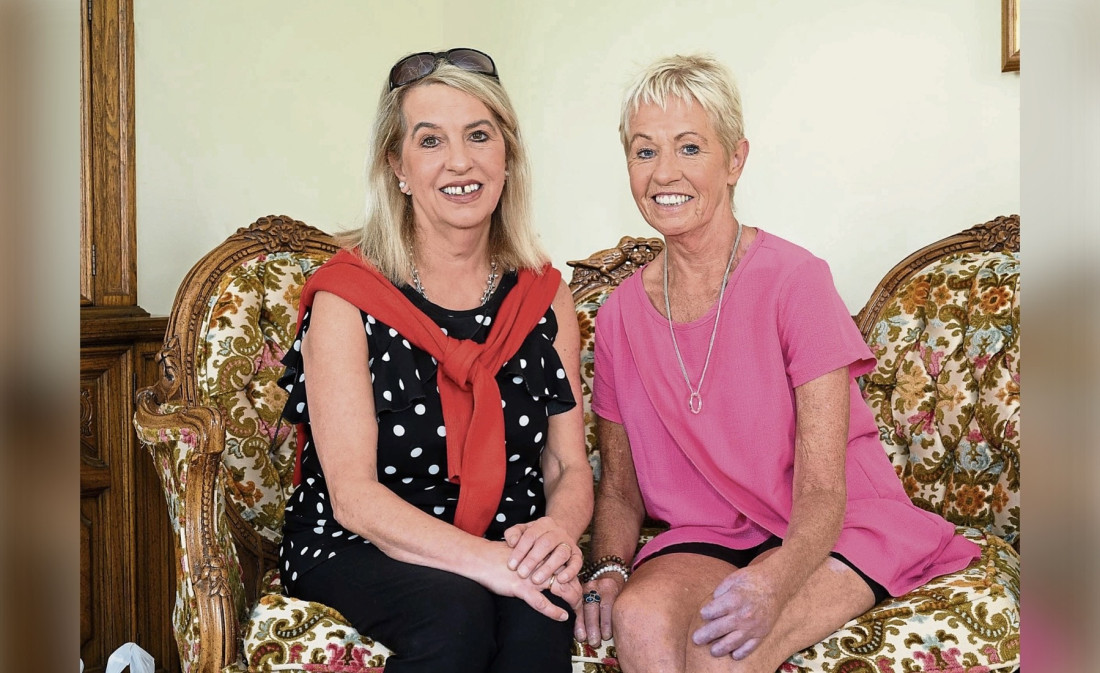A KILLYGORDON woman who survived sepsis last year thanks to the fast actions of her sister, who is a nurse, is warning people to know the signs of this life-threatening condition.
As World Sepsis Day approaches Moninne Bradley has shared her terrifying experience of this fast-spreading condition in the hope it will save someone else.
Moninne wants the public to know that had it not been for her sister, Nurse Orla Noonan’s, speedy actions, she might not be here today.
Moninne explained that in the weeks leading up to her collapse she had been fighting an infection taking antibiotics and steroids in the hope of clearing it up.
She later developed spots on her throat and thought it was a side effect of the antibiotics. When she returned to her GP she was started a course of tablets to treat thrush, an unwanted condition which sometimes occurs after taking antibiotics.
On the day last year before she was hospitalisation, Moninne had gone to work as usual.
She was still concerned about a swelling that appeared on her neck and had planned to return to her GP as a precaution the following day.
“I had been fighting an infection for a few weeks but was still going to work and getting on with things. I thought I might go back to the GP to be sure but at 9pm that night I took very ill and spent the entire night vomiting,” she recalled.
Her sister Orla, a nurse in Letterkenny University Hospital, was keeping a close eye on her because she had not been well. However, despite Orla’s years of experience, she was left stunned by the sudden and rapid deterioration of Moninne’s condition.
“I saw her at 6.30 that evening and she was standing in my kitchen talking. She was a little concerned about the lump on her neck but there was absolutely nothing alarming.
“I couldn’t believe when I saw her the following morning when I came off night duty. I got the shock of my life. She had gone downhill so quickly. She was agitated, shaking and exhausted. She was a terrible colour. As a nurse, I have regularly checked blood pressures, but she was too agitated to accurately record it,” Orla said.
She quickly rang Moninne’s friend Marie for support then contacted Moninne’s GP. She was so concerned that she also rang the Emergency Department in LUH and was advised to call an ambulance.
Moninne was rushed to LUH where she was treated for sepsis in ED and transferred to ICU. The following day she was transferred to University Hospital Galway where her condition continued to deteriorate.
“We didn’t know if she was going to make it. At one point they felt they would have to amputate her arm,” Orla said.
Moninne went into renal failure and lost the tips of her fingers on one hand. However, after 14 days in ICU, she began to slowly recover.
Moninne remembers nothing of her ICU hospital stay but was left stunned to discover how ill she had become.
“I had heard of sepsis but I had no idea just how quickly it could hit you. If it had not been for Orla I would not be here. I am hugely grateful to the ambulance team, ED, ICU teams and hospital staff in Letterkenny and Galway hospitals. I also want to thank my family, friends and community for all their prayers. I’m lucky I survived and I plan to mark every day of it.
“I’m still in recovery but I’m getting there. I want to make sure other families have the knowledge when it comes to sepsis,” she stressed.
Siobhan Kelly, Sepsis Lead at LUH said: “We are taking this opportunity to make people aware of what Sepsis is and how serious it can be.
“Sepsis is a common, time-dependent medical emergency which can affect a person of any age, from any social background and can strike irrespective of underlying good health or medical conditions. However, early recognition and timely referral to critical care can have a major impact and this is the message we want to get out.”
Paul Hooton, Chief Director of Nursing, Saolta Hospital Group added: “Sepsis is a silent killer. This serious condition can very quickly lead to multi-organ failure and often death. However, as Moninne’s story shows, prompt recognition of the condition and treatment will save lives. I urge all of you to familiarise yourself with the signs and symptoms of sepsis and never hesitate to call for help if you are worried.”
Sepsis is a life threatening condition caused by an infection that affects the organs and kills one in five people who develop it. Over 13,000 patients received treatment for sepsis in Irish hospitals in 2021. If you have an infection, know the signs of sepsis. It’s important to get treatment early if you need it. More information on sepsis can be found at hse.ie/sepsis.










